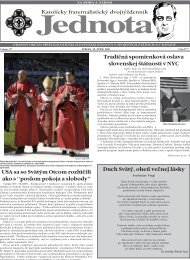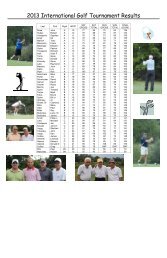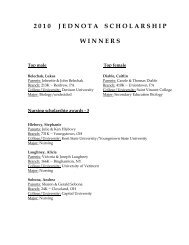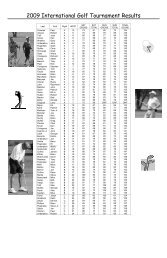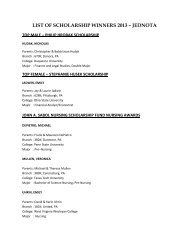Inside - First Catholic Slovak Union
Inside - First Catholic Slovak Union
Inside - First Catholic Slovak Union
You also want an ePaper? Increase the reach of your titles
YUMPU automatically turns print PDFs into web optimized ePapers that Google loves.
PAGE JEDNOTA, WEDNESDAY, MARCH 31, 2010<br />
Insights and Viewpoints<br />
St. Vincent Archabbey ––– Homilies<br />
Father Campion P. Gavaler; Father Demetrius R. Dumm O.S.B.<br />
Second Sunday of Easter<br />
John 20:19-31<br />
Gospel Summary<br />
It is surely an understatement to say that<br />
the disciples were filled with joy as Jesus<br />
appeared to them, alive and well, on that<br />
first Easter day. It will take years for them<br />
to draw out all the wonderful implications of<br />
this dramatic moment in their lives but for<br />
now it is sheer joy. Jesus then gives them<br />
a mandate to bring peace to the world by<br />
translating their happiness into the difficult but rewarding gift of forgiveness.<br />
The story of “doubting Thomas” is presented as a warning to<br />
those of us who have trouble trusting the spiritual side of life. Thomas<br />
is called the “twin,” possibly because he had a striking physical<br />
Demetrius R. Dumm<br />
O.S.B.<br />
resemblance to Jesus, but he discovers that this does not give him any advantage at all.<br />
What counts now is a spiritual relationship. We often assume that those who knew Jesus<br />
in the flesh had a great advantage over the rest of us and we may even envy them. In fact,<br />
however, the risen Lord is far more present to us now in the Spirit than he ever was in the<br />
flesh.<br />
Finally, the author of the gospel reminds us that everything he has written is intended, not<br />
primarily to give us information about Jesus, but rather to bring us to faith in him and thereby<br />
to lead us to real “life in his name.”<br />
Life Implications<br />
The last verses of this gospel passage are among the most challenging passages in the<br />
entire gospel. In the first place, we are told that the whole gospel of John is intended to bring<br />
us to “believe that Jesus is the Messiah, the Son of God.” This does not mean simply that<br />
we accept the fact that Jesus is the fulfillment of Israel’s hopes and, much more than that,<br />
the very Son of God, equal to the Father and the Holy Spirit. To believe in Jesus means also<br />
that we accept the message, found in his words and in his example, of total self-giving for<br />
the sake of others. When we truly accept this message, we pledge ourselves to live and love<br />
as much as possible Jesus did.<br />
What is the consequence of such a radical way of living It enables us to participate in the<br />
very life of Jesus. As the gospel puts it, the whole purpose of believing is that “you may have<br />
life in his name.” This statement is far more daring and revolutionary than we may think. For<br />
it means that, through love of others, we begin to participate in the love and life of God. To<br />
love unselfishly is to love as God loves, and that means sharing in God’s life, insofar as mere<br />
creatures can do so.<br />
In other words, we are invited to share in a life that is far superior to the fragile, uncertain<br />
life of our mortal existence. This new life is given in baptism but it must be nourished by our<br />
commitment to loving service and by our participation in the Eucharist, the ultimate sacrament<br />
of love and concern for others.<br />
St. Paul expresses the same conviction when he writes those wonderfully consoling<br />
Reflections on Our Christianity Msgr. Edward V. Rosack<br />
Humanity of Jesus Christ<br />
The first gospel written was Mark, c.70 A.D. Matthew followed<br />
post 70 A.D., and Luke, c. 75 A.D. The gospel of John is dated<br />
between 90 and 100 A.D.<br />
Mark served as an interpreter for Peter and he is identified with<br />
that Mark in 1 Peter 5:13, “The church that is in Babylon, chosen<br />
together with you, sends you greeting, as does Mark my son.” See<br />
also Acts 12:12, “After coming to realize this, he went to the house<br />
of Mary the mother of John (also known as Mark), where many others<br />
were gathered in prayer.”<br />
In this gospel of Mark, we come to know Jesus in his humanity.<br />
Msgr. Edward V. Rosack<br />
After his cure of the leper, “Jesus gave him stern warning and<br />
sent him on his way. ‘Not a word to anyone, now,’ he said. ‘Go<br />
off and present yourself to the priest and offer for your cure what Moses prescribed. That<br />
should be proof for them’,” (Mark 1:43-44)<br />
“He looked around at them with anger, for he was deeply grieved that they had closed their<br />
minds against him.” (Mark 2:5)<br />
“Then he said to them, ‘Why are you so terrified Why are you lacking in faith’ A great<br />
awe overcame them with this. They kept saying to one another, ‘Who can this be that the<br />
wind and sea obey him’.” (Mark 4:40 – 41)<br />
In Mark 5:21-43, he writes about the daughter of Jairus and as you read this, reflect upon<br />
these verses: “Fear is useless. What is needed is trust.” (vs. 36) “Why do you make this din<br />
with your wailing The child is not dead. She is asleep. At this they began to ridicule him.<br />
continued on page 4<br />
words: “Therefore, we are not discouraged; although our outer self is wasting away, our<br />
inner self is being renewed day by day” (2 Cor 4:16). This inner renewal is nothing less than<br />
the growth of God’s life within us.<br />
April 18, 2010<br />
Third Sunday of Easter John 21:1-19<br />
Gospel Summary<br />
Simon Peter and his companions after fishing all night catch nothing.<br />
At dawn as they approach shore, someone on the shore whom<br />
they do not recognize directs them to cast out their net. When the<br />
net is filled with a large catch, the beloved disciple recognizes Jesus,<br />
now risen from death, and says to Peter, “It is the Lord.” When<br />
they reach shore, they see a charcoal fire with fish on it and bread.<br />
Jesus invites them to eat with him. He takes bread and gives it to<br />
them and in like manner the fish. Jesus then asks Peter three times<br />
if he loves him, and says to him in turn, “Feed my lambs…Tend my<br />
sheep…Feed my sheep.” Jesus then speaks of the kind of death<br />
Simon Peter will undergo, and says to him, “Follow me.”<br />
Life Implications<br />
Friendship with Jesus is the one essential thing of life, regardless<br />
JEDNOTA<br />
(ISSN 1087-3392)<br />
<strong>Catholic</strong> Bi-Weekly Issued 26 Times Annually<br />
Publisher and Proprietor<br />
FIRST CATHOLIC SLOVAK UNION of the United States of America and Canada<br />
FCSU Corporate Center<br />
6611 Rockside Road, Suite 300<br />
Independence OH 44131-2398<br />
Teresa Ivanec, Editor; fcsulifeeditor@gmail.com<br />
SUBSCRIPTION RATES: UNITED STATES - $25.00 All other countries – $30.00<br />
PRINTED AT: SUSQUEHANNA PRINTING, 1 East Main Street, Ephrata , PA 17522<br />
Telephone: 216/642-9406 Fax: 216/642-4310<br />
POSTMASTER: Please send address changes to:<br />
Jednota, <strong>First</strong> <strong>Catholic</strong> <strong>Slovak</strong> <strong>Union</strong>, 6611 Rockside Road, Suite 300, Independence, OH 44131-2398<br />
Periodical Postage paid at Cleveland, OH 44131 and additional mailing offices<br />
Campion P. Gavaler,<br />
O.S.B.<br />
of any other circumstance--sickness or health, poverty or wealth, low or high position in society<br />
or church. That is the supreme truth John wants to tell us in his gospel. The good news<br />
is that Jesus desires our friendship, and offers it to all who welcome him in faith. We can<br />
identify with many of the persons Jesus encounters in the gospel—the Samaritan woman,<br />
Martha and Mary, Lazarus (at whose death Jesus wept), Peter, Mary Magdalene, the beloved<br />
disciple. The gospel also warns us not to identify with those who reject friendship, and<br />
even betray friendship with Jesus. Jesus can also call us his friends because he has told us<br />
everything he has heard from his Father (Jn 15:15). The titles that we use to address Jesus<br />
(Messiah, Lord, Son of God), however orthodox and exalted they may be, are inadequate to<br />
express the full meaning of Jesus for us unless they include “Beloved Friend.”<br />
A personal, loving relationship with the Risen Lord clearly was a distinguishing characteristic<br />
of John’s community. Sad experience, however, soon revealed that individual relationships<br />
with Jesus were not sufficient to hold the community together. We can see from the<br />
<strong>First</strong> Letter of John that various individuals, claiming to speak with the Spirit of Jesus, began<br />
to teach false doctrines. Eventually they formed splinter groups that separated people from<br />
the community. In our gospel passage today, John shows us that individual friendships with<br />
Jesus must be complemented by authority within the community. The Risen Lord commissions<br />
Peter to serve that function.<br />
That authority that Jesus gives, however, must be exercised out of deep friendship with<br />
him. “Do you love me” Jesus asks Peter the crucial question three times as he commissions<br />
him to tend and to feed his sheep. The principle, of course, applies not only to the<br />
successor of Peter, but to everyone who exercises authority in the church, from the family to<br />
the chancery. Only in this way does human authority becomes an expression of the authority<br />
of Jesus, the Good Shepherd who lays down his life for his sheep.<br />
In today’s gospel passage, John also links friendship with Jesus with his real presence at<br />
our Eucharistic meal. The meal Jesus shares with his disciples together with the feeding of<br />
the large crowd (John 6) and the Last Supper Discourse reveal the meaning of the Eucharist<br />
for us. Jesus, the Risen Lord, truly is with us at our sacred meal— speaks to us, prays with<br />
us, leads us in self-giving to the Father, gives himself to us as our bread and wine. He calls<br />
us his disciples and his friends: the life implications remain the same. Jesus also says to<br />
us: “If I, therefore, the master and teacher, have washed your feet, you ought to wash one<br />
another’s feet” (John 13:14). The way we will fulfill his request to follow him as disciples in<br />
service of others is unique and particular for each of us. We can count on the Spirit of Jesus<br />
to guide us in discerning what that service will be.



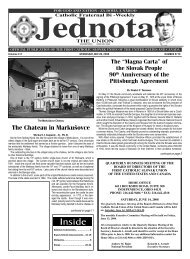
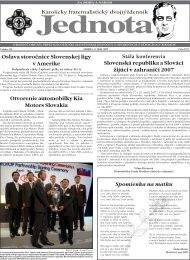
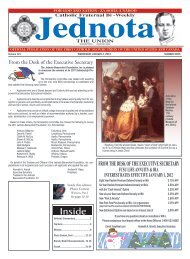
![Kardina;l Tomko na levoc'skej pu;ti zdo]raznil vy;znam manz'elstva U ...](https://img.yumpu.com/50723466/1/190x260/kardinal-tomko-na-levocskej-puti-zdoraznil-vyznam-manzelstva-u-.jpg?quality=85)


